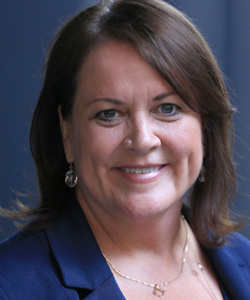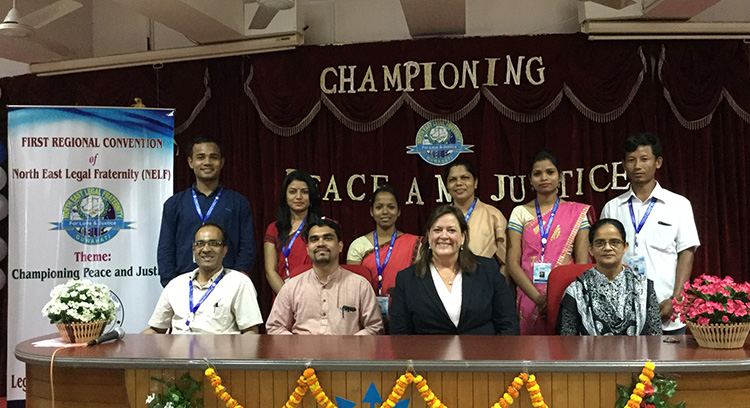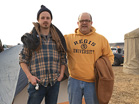
|
|
| Judge Virginia Kendall |
|
It’s time for a coffee break at the First Regional Convention of North East Legal Fraternity (NELF) in Guwahati, a city in Assam in Northeast India. Young lawyers and law students wear the colorful dress of their tribe for this formal occasion. They rush to me with their cell phones: “Please, m’om, a selfie!” I'm a celebrity in Assam, where the Jesuits have asked me to speak about my area of legal expertise — human trafficking.
It is rare for a Westerner and judge to come to speak about the law. “Don't tell my husband you are doting on me,” I joke, standing out like the foreigner I am. It is hot in Guwahati, and even the class is tired, so one young lawyer stands in front of the group announcing, “Up on your feet, let’s sing.” Everyone joins in a song about turning oneself to the Lord with true faith. We clearly are not in the United States, where separation of church and state would prevent such a display. But here in Assam, Catholics are the minority. Every greeting, discussion, and departure is marked by lawyers exchanging statements of faith.
Most Indians who live in Northeast India have never left, and those who live elsewhere rarely come. It is isolated, poor, lacking in education, and directly in the path of large human trafficking networks. Nepalese women separated from their families after the earthquake are sold into sex slavery, children are purposely maimed on the street to beg for organized traffickers or stolen from their families to work in traveling circuses, and individuals are drugged so their organs can be sold. It is located amidst places I have written and spoken about in treatises on the massive human rights violations plaguing the international community. Now, I am surrounded by young Indian lawyers and students who want to learn about human trafficking and help eradicate it.
Father Ravi Sagar, SJ, director of the Legal Cell for Human Rights, Guwahati, has set the impressive agenda, with the theme of championing peace and justice. We start the program with the traditional lighting of an oil lamp, a prayer, and the ceremonial bestowing of a jaapi, a broad-rimmed hat made from bamboo cane, and a gamosa, a gesture of welcome uniting all of Assam’s tribes. It is presented to this visitor to keep the hot sun off her face and wipe the sweat off her brow.

|
| Judge Virginia Kendall with participants in the First Regional Convention of North East Legal Fraternity in Guwahati in Northeast India |
No one wants to stop the discussion or take the next coffee break. We talk through dinner. They are starving for information and change. They have seen the poverty and sadness. "Fraud, force, and coercion” keep returning to our conversations, and they all agree there is much more to be done.
The day ends with a prayer and blessing. The morning will begin the same way. Soon I will make the grueling journey back to the states, where religion will be tucked in my pocket with my rosary. Meanwhile, I will bask in the fulfillment of speaking about human trafficking — both from a legal perspective and as the moral violation of human dignity it most certainly is.
Judge Virginia Kendall was appointed to the United
States District Court for the Northern District of Illinois by President George
W. Bush in January 2006. She is an expert on child exploitation and human
trafficking and serves as an adjunct professor at the Loyola University Chicago
School of Law, the Northwestern University Pritzker School of Law, and the
University of Chicago Law School. Her book with T. Markus Funk, Child Exploitation and Trafficking: Examining Global
Enforcement and Supply Chain Challenges and U.S. Responses, was recently
published by Rowman & Littlefield
Click here for the Spring 2017 Jesuits magazine index.




